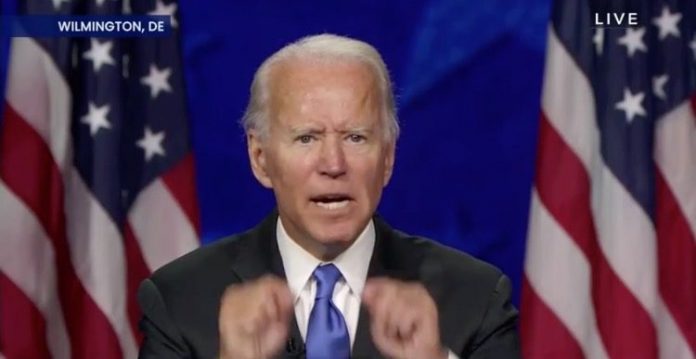This story originally was published by Real Clear Wire
By Michael Makovsky & Blaise Misztal
Real Clear Wire
“Don’t.” That has been President Biden’s repeated message to Iran and Hezbollah in the year since Hamas attack Israel on October 7. Well, Iran just did. Again. That makes Tehran’s October 1 attack on Israel with about 180 ballistic missiles a test not just of Israeli resolve, but of American credibility. The United States should join with Israel in imposing, as national security advisor Jake Sullivan said, “severe consequences” on Iran.
The Biden administration’s strategy throughout the last year of conflict has been to seek de-escalation and avoid a broadening of the conflict wherever and whenever possible. That was the import of President Biden’s warning of “don’t” in last October, telling Iran and Hezbollah to avoid joining Hamas’s savage attack. He issued the same warning in April, as Iran was preparing to strike Israel.
The administration also backed up its warnings by deploying significant military assets to the region. That might have helped prevent a Hezbollah invasion of Israel a year ago, but that is about the extent his warning’s effectiveness.
Hezbollah attacked anyway, just from the air. Just a day after 10/7, it began raining rockets on northern Israel in a year-long war of attrition that has left over 60,000 Israelis homeless. Despite Biden’s warnings, Iran now has twice fired an unprecedented amount of missiles at Israel, which could have inflicted untold damage on Israel if they had penetrated Israeli airspace and hit population centers. Fortunately, Israeli and American air defenses neutralized them.
Indeed, Biden’s commitment to Israel’s self-defense has been admirable. His U.S. deployment of military assets has critically helped Israel in its defensive actions. But it is not just Iran that Biden has been trying to deter, it is Israel, too. And in that he has been far more successful.
Repeatedly, over the past year, Biden has said “don’t” to Iran, but Iran and its proxies did; Biden helps defend Israel, then tells Israel “don’t.” The Biden administration has opposed every Israeli action that would truly deter the Iranian axis and enable actual victory, such as the ground incursion in Gaza, the conquest of Rafah, and the killing of Nasrallah. After the April 13 Iranian attack, Biden told Israel to “take the win.”
The same pattern is repeating itself again.
That Israel emerged unscathed from Iran’s barrage does not diminish the fact that, rather than heed Biden’s “don’t,” Iran did. Nor should the relative lack of damage in Israel limit what the response to Iran’s attack will be, which is what Biden seemed to be suggesting when he said he would not support an Israeli strike on Iran’s nuclear sites because “they should respond in proportion.” Any proportionality should be judged based on Iran’s actions—firing some 180 ballistic missiles, including at Israel’s nuclear sites—not their outcome.
All this undermines already fragile American credibility, not just in the Middle East, but globally. Russia, China, and U.S. allies and the world over see Israel’s, and America’s, adversaries disregard U.S. demands not to attack. They see that the United States is willing to help defend against Iranian attacks, but not take action to prevent them. The empty threats and false distinctions between defense and offense erected by the administration all suggest timidity in facing adversaries and reluctance in backing partners, eroding the credibility of U.S. security guarantees.
The Biden administration can both restore its credibility and advance its security interests by joining Israel in taking strong, offensive action against Iran in response to its missile attack. The imperative to do so is even after Sullivan has promised “severe consequences” and said that “we will work with Israel to make that the case.”
After all, the fight against the Iranian axis is not just Israel’s, but America’s, too. Iran and its terrorist proxies have killed thousands of Americans over the years and still actively plot to do so today. The only to stop these attacks and the threats is to inflict real pain on Iran.
Israel is defanging Iran’s proxies, but a joint U.S.-Israel effort to destroy Iranian nuclear facilities would be extremely damaging to Tehran. If that was coupled with severe sanctions on Iranian oil exports, it would force Iran to limit its aggression. It would also put immense pressure on the already weak Tehran regime, perhaps enabling the Iranian people to collapse the mullah thugocracy. With such bold action, the United States could punish Iran’s attack on Israel, deny Iran weapons of mass destruction, and bolster its credibility, all at the same time.
Iran didn’t heed Biden’s “don’t.” Now it is time for “we will.”
Michael Makovsky, a former Pentagon official, is president and CEO of the Jewish Institute for National Security of America (JINSA).
Blaise Misztal is JINSA’s vice president for policy.
The post The Failure of Biden’s ‘Just Say Don’t’ Foreign Policy appeared first on The Gateway Pundit.
This article may have been paraphrased or summarized for brevity. The original article may be accessed here: Read Source Article.









